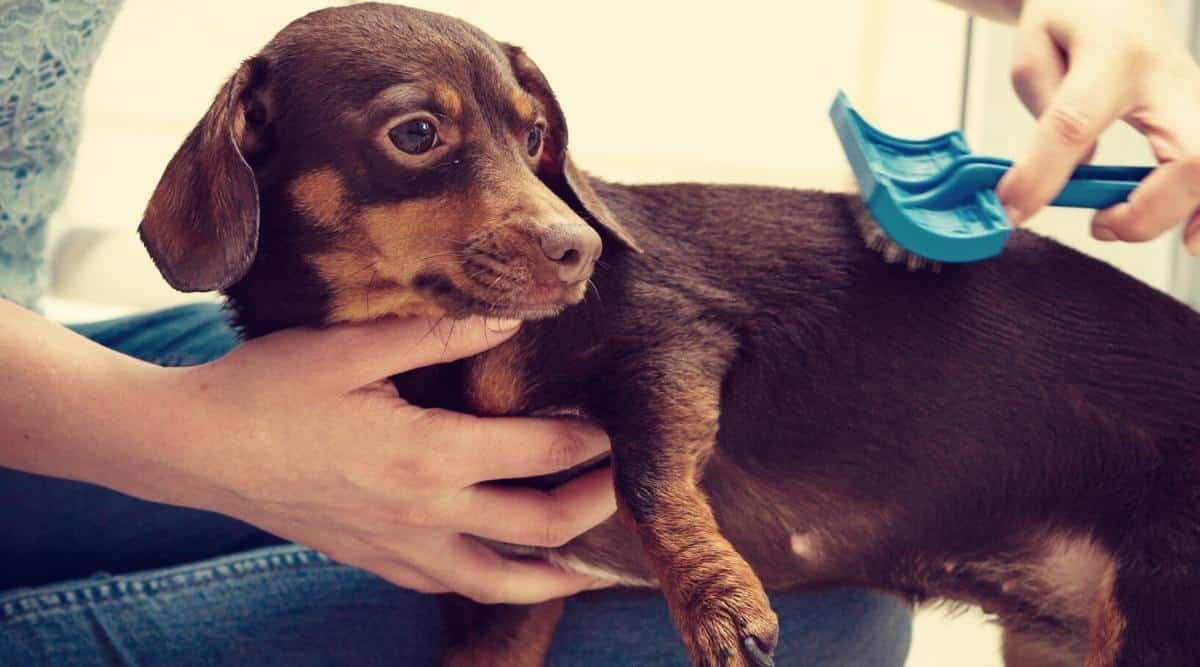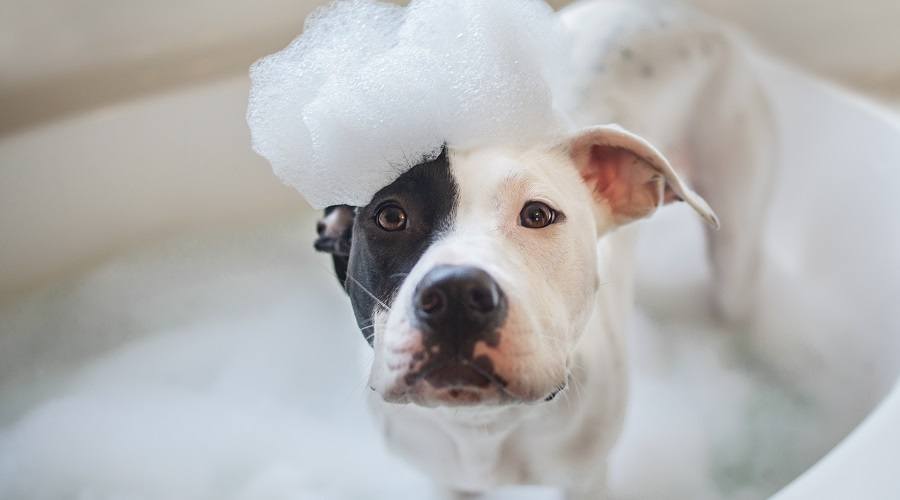Australian Shepherd Shedding: How Much Do Aussies Actually Shed?
When you purchase through links on our site, we may earn a commission. Here’s how it works.
Australian Shepherds are unique looking canines. From their stunning looks to their shaggy coats, these pups are adorable. There’s even a possibility your Aussie can have blue eyes, making them look even more striking. But do Australian Shepherds shed? It’s common to want to find out how much grooming work you signed up for before welcoming a new dog into your home.
Table of Contents
Australian Shepherds were not in fact bred in Australia but in the United States. They were created as a herding dog breed that was meant to herd livestock in colder areas, so their fur needed to stand up to the task of keeping them warm during the winter.
Australian Shepherds have double coats. So the quick answer here is that yes, Aussies do indeed shed. In fact, they shed quite a bit. But it’s not unmanageable. You’ll want to stick to regular grooming routines in order to keep your Aussie’s fur off your furniture or your clothes. There’s also some grooming hacks you can use to help solve for dog fur in a pinch. Let’s jump in and take a look at what you can expect when welcoming an Australian Shepherd into your home, as well as some tips to keep shedding to a minimum.
At A Glance: Best Products For Australian Shepherd Grooming
Australian Shepherd Coats
Aussies have double coats. This means that they have a topcoat and an undercoat. The thickness of their undercoat will depend on the time of year. It gets thicker in the winter to protect against the elements. It thins out in the summer to keep them cool. Double-coated dogs shed more than single coated dogs, so that’s the reason that your Aussie is likely to shed more than a Maltese or other single-coated breeds.
Australian Shepherd Coat Colors
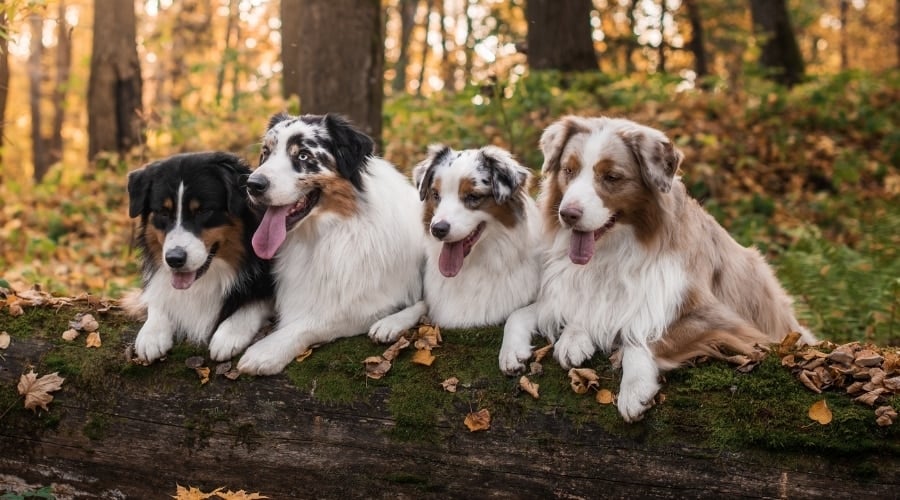
Aussies can have a number of different coat colors. These colors include Black and Liver, with copper markings. They can have tri-colored coats that include Black or Liver, with white as well. Aussies are also commonly seen with Merle patterns. They can also be completely tan, completely copper, or all white. Because of their coat colors and similar looks, Australian Shepherds are commonly confused with Border Collies.
Shedding Frequency
As we’ve mentioned, Australian Shepherds do shed considerably. They are a double-coated breed, so you can expect a healthy amount of year-round dog fur left in your home, and on your clothes. Because they are double-coated, they also have two periods of time each year where their fur sheds more considerably.
During the wintertime and during the summer, you’ll need to keep up with your Aussie’s grooming and invest in a quality deshedding tool, like the Furminator. This will help keep dead and loose fur away during these aggressive shedding periods. Deshedding tools usually aren’t needed year-round. If you stay on top of regular grooming, these tools are most effective during seasonal shedding timelines.
Other Reasons Aussies Shed
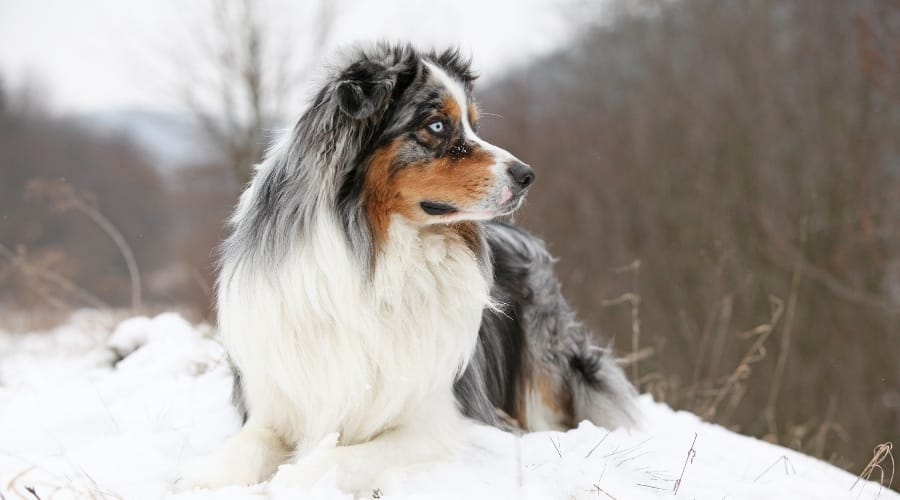
If you’ve recently noticed your Australian Shepherd shedding more than normal, there could be several reasons for this. In most cases, shedding a little more than normal isn’t a cause for concern. However, if you have an older dog, or your dog’s behavior has changed, there could be other underlying medical or behavioral issues that need to be addressed. Here are a few common reasons your Aussie may shed more than normal.
Stress and Anxiety
Aussies are anxious dogs. They wear their heart on their sleeves, and if they are stressed, you’ll see them start to take on other behaviors that may not be normal. You may see your dog start to pace, become fearful, or start to shed excessively. This is common when a new pet is welcomed into the home, a new child is born, or other stressful life events. If you’ve had a life-changing event, it’s likely that fur loss is temporary.
Routine Changes
Routine changes contribute to stress and anxiety. Rather than welcoming a new dog, cat or child into your home, just changing your dog’s routine may lead to shedding. This could be someone returning to work, or starting doggy daycare. Big shifts in routine can lead to excess fur loss.
Skin Allergy or Mites
If your dog recently developed a skin allergy to grass or another seasonal plant, it may cause shedding. This is likely something to consult your veterinarian about. If it’s something that has a very short season, it may be anything to worry about. Your vet can also prescribe medication to make it more manageable. Your dog may also have mites, which are treatable.
Food Change
Some dogs are allergic to certain dog food ingredients. Common allergies include peas, potatoes, and certain types of grain. If you recently changed your dog’s diet, this is something you should monitor.
Medical Conditions
Other more serious conditions like cancer can cause excess shedding. If your dog’s behavior has changed and they’ve become withdrawn, schedule an appointment with your veterinarian to get to the root of the problem.
Managing Your Aussie’s Shedding
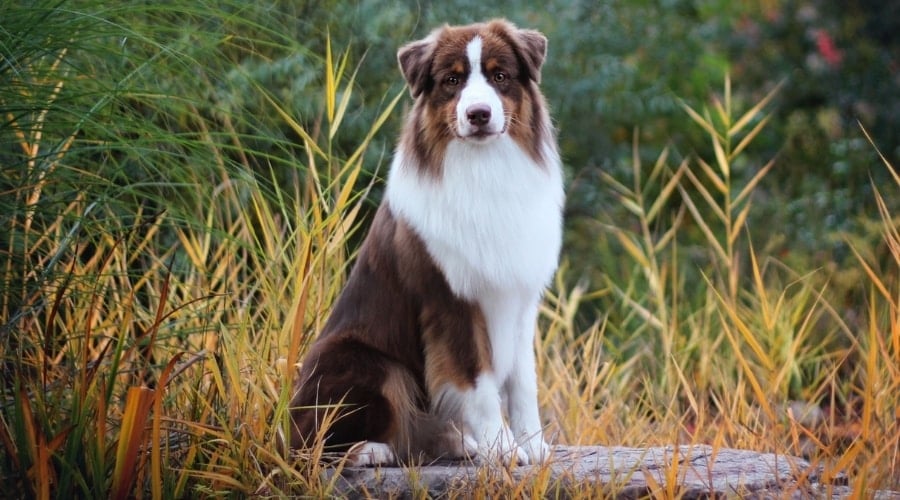
Now that you’ve learned about what a normal shedding frequency is, or other reasons why an Australian Shepherd might be shedding more than normal, it’s time to learn how to manage it. The Aussie is a wonderful family dog breed. Their shedding habits shouldn’t be the sole reason you decide if it’s the right breed for your family. All their shedding is manageable, provided you follow a certain grooming routine.
Bathing
Bathe your Australian Shepherd about once every three to four weeks. Anything more than that will strip your pup of the natural oils that occur on their skin and in their coat. Brush your pup right after bath time for best results. Bathing will help free up some of the looser fur in the undercoat and make it easier to remove with a brush after bath time is over.
Shampoo
Use a natural dog shampoo for your Aussie. We don’t recommend using an Anti-Shed shampoo unless it’s also made with natural ingredients. These shampoos can be harsher on your pup’s skin, so a natural formula is usually best. Australian Shepherds have more sensitive skin than other breeds, so calming ingredients like oatmeal can help ensure your pup doesn’t have any adverse reactions with their skin.
Brushing
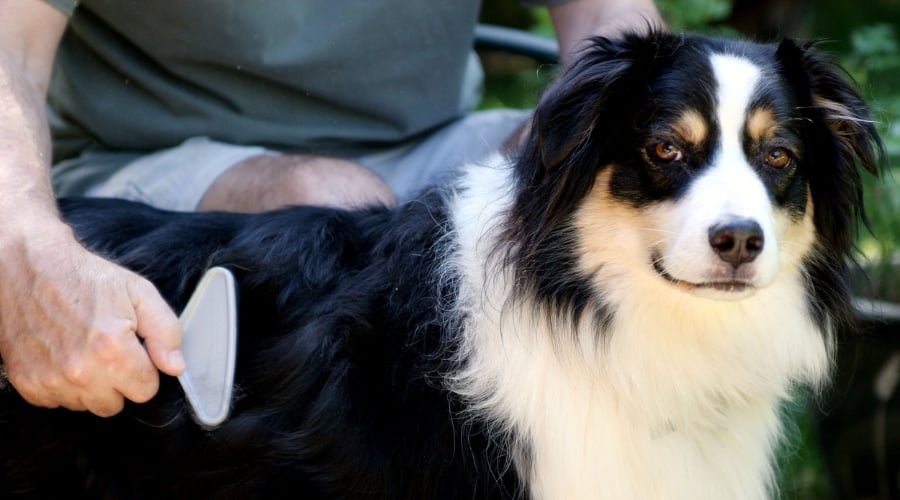
Brush your Australian Shepherd weekly. Ideally, you’d brush them 2-3 times per week, outdoors. This way you keep fur out of your home. Because the Aussie has a lush double coat, we recommend using a pin brush. Bristle Brushes don’t get into the second layer of fur, and will still leave plenty of undercoat laying around your home, especially in shedding season. On top of brushing, you’ll want to own a Deshedder, and use that at least a few times per year during shedding season.
Diet
Diet is often overlooked when it comes to shedding. But nutrition is an easy fix. You’ll want to feed your Australian Shepherd a dog food formula that’s rich in Omega three and six fatty acids. If your dog has an allergy to peas, lentils, or legumes, there are dog food options that don’t contain any of those ingredients. If your dog has a poultry allergy, there are lamb or red meat focused dog foods that contain no poultry or poultry by-products. Grains are also a common intolerance for many breeds. You’ll need to give your pup a little time to adjust to their new diet, but double-checking nutrition can be important to solving your Aussie’s shedding mystery.
Supplements
Supplements are also great for coat health. Yes, supplements may not solve your dog’s shedding problems immediately. But Omega Three and Six fatty acids do contribute to both skin health and coat health. Having the right balance of Omega fatty acids in your dog’s diet will help keep their skin and coat healthy. While it may be inconvenient to pick up a supplement to help with coat health, these are often now available in chewable form, or in liquid form, which can be placed on your dog’s food.
How To Keep Your Home Clean
Even if you stay on top of your dog’s shedding, you’re bound to have dog hair around your house that needs cleaning up. We have lots of experience in this department. Depending on your cleaning preferences, you may find one or all products suitable for your home.
Robot Vacuum
If you want the cleaning done for you, then we recommend the Shark IQ Robot Self-Empty XL. This self-cleaning robot vacuum can map out your home, so you can send it to a specific area that needs cleaning. You can also set “no-go zones” for areas around your dog’s food and water bowls to ensure the vacuum doesn’t mess with those areas. The brushroll removes pet hair, so there is no hair wrap, and the self-emptying base holds up to 45 days of dog hair, dirt, and debris.
Cordless Vacuum
Bissell’s ICONpet Edge vacuum is perfect for general vacuuming and getting those hard-to-reach areas like windowsills, room corners, underneath furniture, etc. It’s cordless, so it’s easy to grab and go. It includes several attachments to help clean up the dog hair on your stairs, hardwood floors, and everywhere in between.
Air Purifier
Filtrete’s air purifier captures 99.97% of airborne particles, including pet odors and dog hair. This air purifier can help clean the air in a room up to 250 square feet in size. It notifies you when the filter needs changing to ensure optimal performance. You can adjust the fan speed, set a timer, and dim the control panel lights from the soft-touch display. If you notice your home has a pet odor, this will help eliminate that fast.
Frequently Asked Questions
Still have questions that we haven’t answered? Here are some of the most common questions we get about Australian Shepherd shedding. If there’s something we’ve missed, feel free to drop us a line in the comments so we can add it!
Do Australian Shepherds shed more in the fall?
Aussies shed more in the winter and summer. It’s possible that your pup may shed more in fall, if environmentally winter comes a little earlier. This is to make way for a thicker undercoat that will protect them more during the winter. This normally occurs during early winter or late fall.
Why is my Aussie shedding in clumps?
This can happen for many reasons. If your dog is shedding in clumps, we’d recommend reaching out to your vet. If you don’t groom your dog regularly, it’s possible their fur will mat, and come out in batches rather than just in smaller amounts. It could also be the result of an underlying health concern, so that’s why we recommend checking with your vet.
Why is my Australian Shepherd shedding SO MUCH?
We’ve addressed that earlier in the article, but the usual suspects are stress, anxiety, change in routine, or nutrition. If you can adjust any of these factors, you may find that your pup goes back to normal shedding levels. Outside if that, it may be time for a trip to the vet.
How bad is Australian Shepherd shedding to deal with?
If you manage it properly, your Aussie will shed no more than any other double-coated breed. It may be more noticeable if your dog has a lighter coat. Lighter colored fur is usually easier to see on darker surfaces and can be more time consuming to deal with. Overall, they don’t shed any more than other double-coated breeds, and it isn’t difficult to deal with if you follow a proper grooming routine.
Which kind of brush should I use when my Aussie sheds?
Use a pin brush for regular grooming. Use a deshedding brush during the two times per year that your Aussie blows their coat. That should be enough to keep dog fur under control for most households.
Final Thoughts
So there you have it! Yes, Australian Shed. But it’s not difficult to deal with as long as you stick to a proper grooming routine. If you are concerned about dog hair, and that’s a leading factor into what type of dog you adopt, you may want to consider an Aussiedoodle or other hypoallergenic dog breed that doesn’t shed as much as a double-coated dog like the Aussie. Don’t let the ability to manage dog fur be the only reason for not welcoming one of these wonderful pups into your home!

